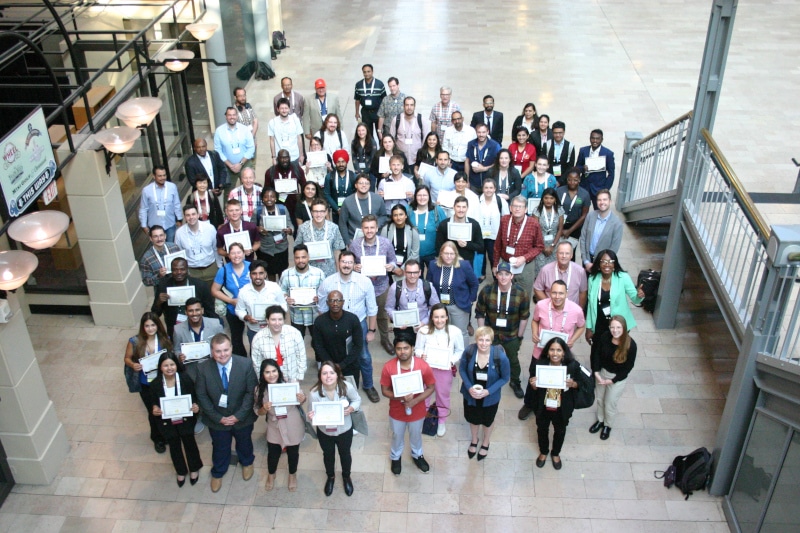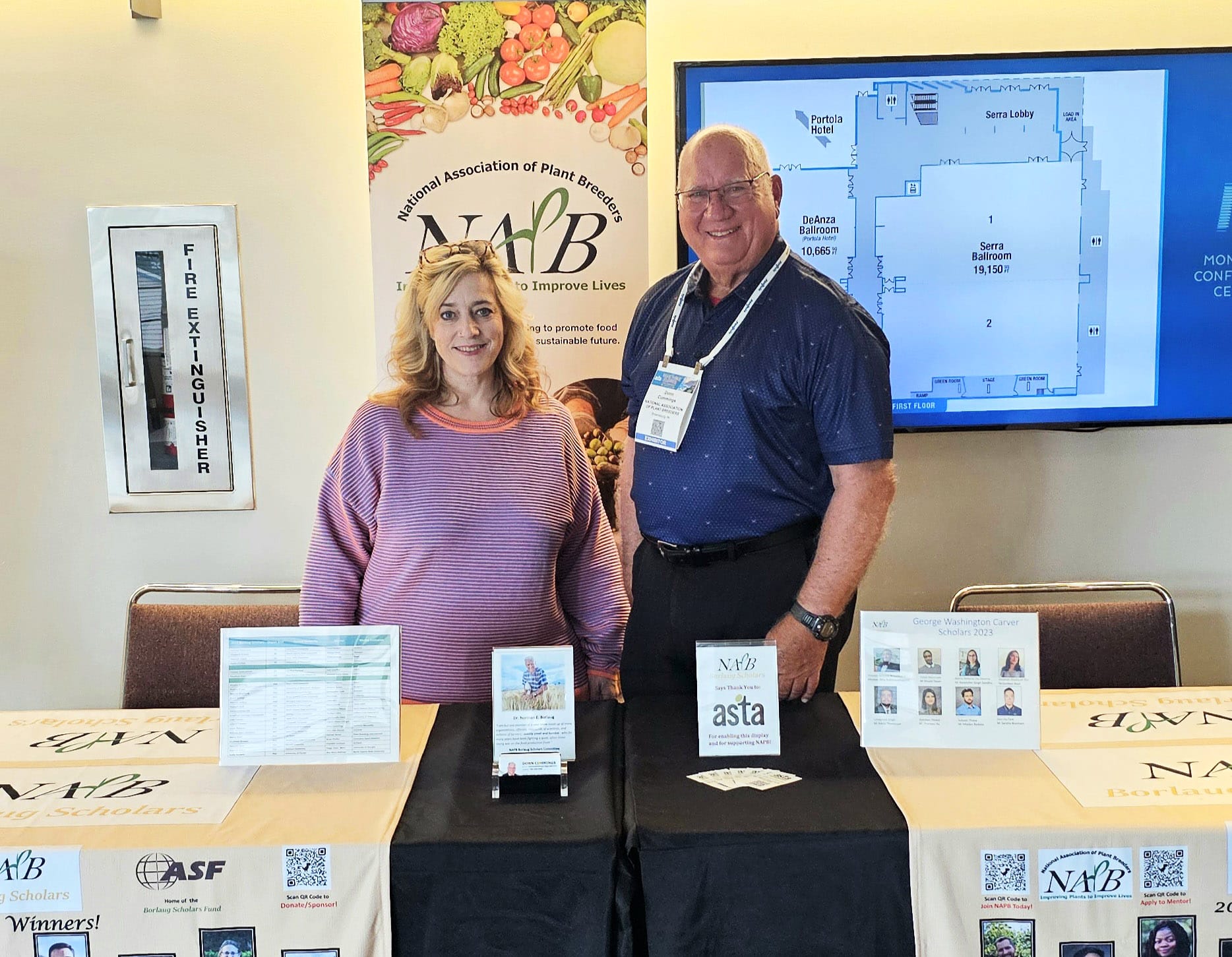At its 2019 annual meeting, the National Association of Plant Breeders (NAPB) presented three awards honoring an outstanding scientist in three categories: Early Career Scientist, Lifetime Achievement, and Plant Breeding Impact. Hosted by the University of Georgia in Pine Mountain, GA from Aug. 25-29, the meeting was held in coordination with the annual meeting of the US Plant Breeding Coordinating Committee (PBCC) and attracted over 400 participants, including over 150 students.
The 2019 NAPB awardees exemplify the very best in plant breeding research, education, outreach and leadership. They model persistent dedication and a passionate devotion to applying their plant breeding skills and technical excellence to promote food security, quality of life, and a sustainable future. They are committed to supporting the next generation of the plant breeding discipline. These outstanding professionals inspire plant breeders and scientists everywhere.
All three awardees will present invited talks at the next NAPB/PBCC annual meeting, to be hosted by the University of Nebraska-Lincoln, Lincoln NE on AUg. 16-20, 2020.
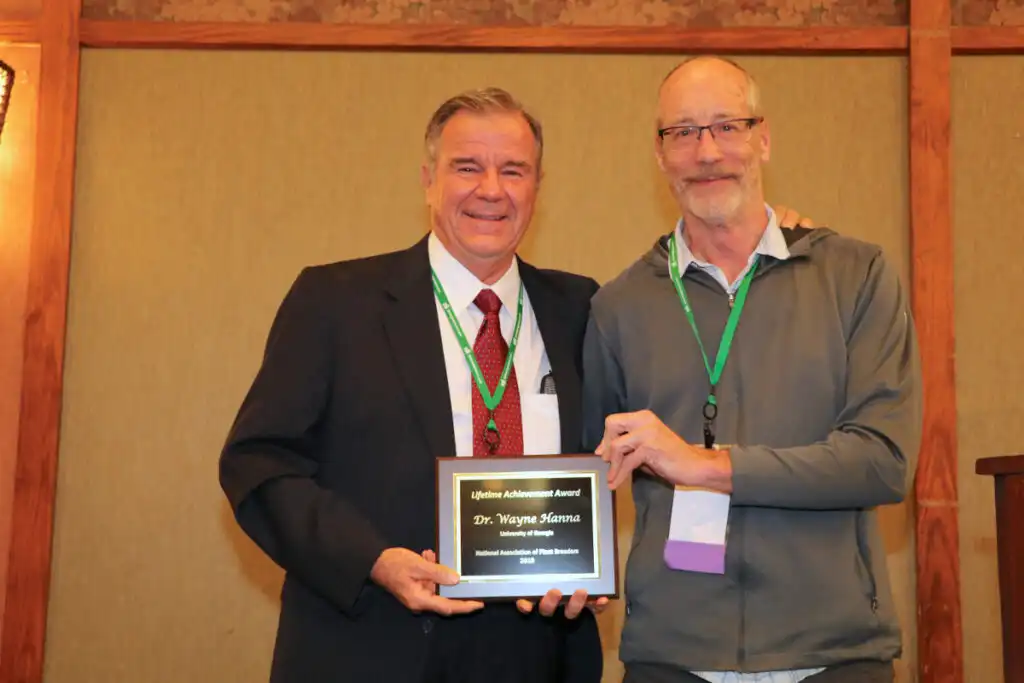
Lifetime Achievement Award: Wayne Hanna
This award, recognizing distinguished long-term service to the plant breeding discipline through research, teaching, outreach and leadership, was given to Dr. Wayne Hanna, University of Georgia, an internationally recognized as a plant breeder of grasses and grain crops, particularly turf grass and pearl millet (Pennisetum glaucum syn. Cenchrus americanus). As one colleague commented: “He is a plant breeder through and through, his mind and efforts are always racing to create new cultivars to solve problems for the betterment of us all.”
Hanna grew up on a farm in south central Texas, attended Texas A&M University and received his PhD in genetics in 1970. After an initial position in white clover breeding at the University of Florida, he took a position with the U.S. Department of Agriculture, Agricultural Research Service at Tifton. From 1971 through 2002, he served as a Research Geneticist, Research Leader, and Location Leader, collaborating closely with colleagues at the University of Georgia.
In addition to his highly successful cultivar development efforts, Hanna conducted seminal and groundbreaking research on the reproductive process of apomixis (asexual reproduction through seeds) in relatives of pearl millet and their hybrids. His research included cytogenetics, genetics, and breeding of forage grasses and turfgrasses . Fundamental studies included research on interspecific hybridization, interspecific germplasm transfer (including apomixis), pollen storage, male sterility systems, chromosome behavior, forage quality components and use of gamma radiation in crop improvement. Breeding foci included disease resistance, improving forage quality, improving cold tolerance, developing better cytoplasmic-nuclear male sterility systems, and developing higher yielding male steriles for hybrid production.
From 2003 until the present Hanna has been employed part-time with the University of Georgia on a wide range of crops, including turfgrasses, seed sterile ornamental grasses, cold tolerant citrus, and cone-less pine trees. From 2007 through 2015 he worked part-time for the Whitetail Institute in Alabama developing white clover cultivars
During his career, he has developed and released 31 cultivars and 35 parental lines, inbreds, and improved germplasms of turf, ornamental, and forage genera, with 27 plant patents and four plant patents in final review. His cultivars are used nationally and internationally for summer grazing and on athletic fields (including the World Cup and Olympics), golf courses and for landscaping.
“Rigorous testing has been a hallmark of Dr. Hanna’s program,” highlights a colleague, “and thus the reason the program has gained such respect from other breeders as well as the industry.” A seed industry stakeholder pointed out: “Dr. Hanna’s primary concerns about new varieties have always been focused on serving needs in the industry, be it golf, sport fields or home lawns and then securing an abundance of performance data before releasing a new variety. I have had many discussions with him over the years as we looked at seemingly attractive selections in his breeding plots that he would insist that needed further testing. This approach has ultimately resulted in his stellar record of winning releases.”
In addition to his numerous plant breeding achievements, Hanna is author or co-author on over 670 scientific papers. directed the research of 10 graduate students and 18 visiting scientists and post-docs and has collaborated with over 150 national and international scientists.
Beyond his professional accomplishments, a colleague highlights Hanna’s personal integrity and commitment: “He and his wife, Mrs. Barbara, have been serving the community of Tifton through church and on their own since the early 1970’s. He is one of the most unselfish people I have ever met and has a heart as large as they come. He has built churches, taken in strangers, and cared for people when no one else would. He loves his family like none other and has made many sacrifices for them.”
Finally, very few plant breeders can boast their program is immortalized in a sign along an interstate highway. However, Wayne Hanna can do just that. On Interstate 75 leading into Tifton a billboard advertises it as the “Turf Grass Capital of the World” — a testimony to both the success and impact of Dr. Hanna’s research.
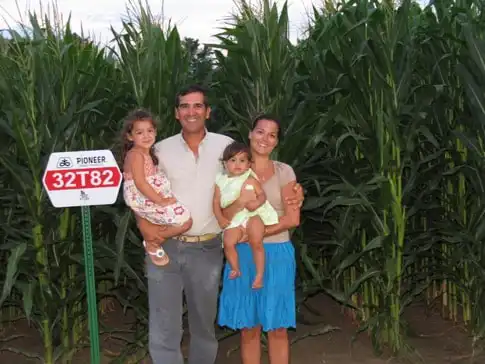
Plant Breeding Impact Award: Luis Verde
This award recognizes an individual in the public or private sector who has made significant advancements in the field of plant breeding, specifically in the area of applied variety and/or technology development. The 2019 recipient is Luis Verde, Maize Product Development Director for Latin America and Global Sorghum Lead for Corteva AgriscienceTM, where he focuses on breeding technologies and methods to accelerate genetic gain and continue delivering the best products to the market.
As his nomination letter states: “Luis has made significant contributions by leading/participating in breakthrough initiatives that have become landmarks of transformation and modernization of breeding across all crops and geographies.”
During his tenure as a field breeder in Pioneer (now Corteva AgriscienceTM), Verde contributed significantly in germplasm development. His maize lines and hybrids have been awarded the John Hoffbeck One Million Award in three occasions (sales exceeding a million bags of seed) and have obtained the Don Duvick Regional Maize Hybrid Award in twelve occasions, having registered more than 90 patents in the US and Canada. Germplasm created by Verde has been commercialized in 18 countries.
One of Verde’s hybrids (P1197) has shown an outstanding genetic jump in productivity compared with the historical trend, increasing relative yield by 27 bu/a or 14%. This genetic improvement for yield is the largest since the beginning of hybrid maize breeding at Pioneer in the 1920’s. Verde’s hybrid reached 542 bu/a yield in the National Corn Growers Association in 2017, breaking what had been considered the unattainable barrier of 500 bu/a.
Luis was born in Uruguay but moved at early age to Argentina, where he earned his B.S. in Agronomy at UNMdelP. In 1998, Luis moved to Iowa to study with Mike Lee and holds a MS and PhD degrees in Plant Breeding from Iowa State University. After obtaining his PhD, Luis was recruited as a Maize Breeder at Pioneer, where he served on several scientific roles, progressing to his current role.
Verde’s professional approach, one colleague observes, underlies his success: “His passion for excellence in breeding programs started with his own individual program and extends to everything else he does from recruiting new breeding talent to integrating the most effective breeding technologies throughout the programs he leads.”
Summarizing Verde’s qualifications for the 2019 NAPB Plant Breeding Impact Award, another Corteva colleague states: “Luis Verde has changed the way we breed today. His success at delivering successful commercial products, improving plant breeding sciences, and helping our teammates grow have had an enduring impact on our organization.”
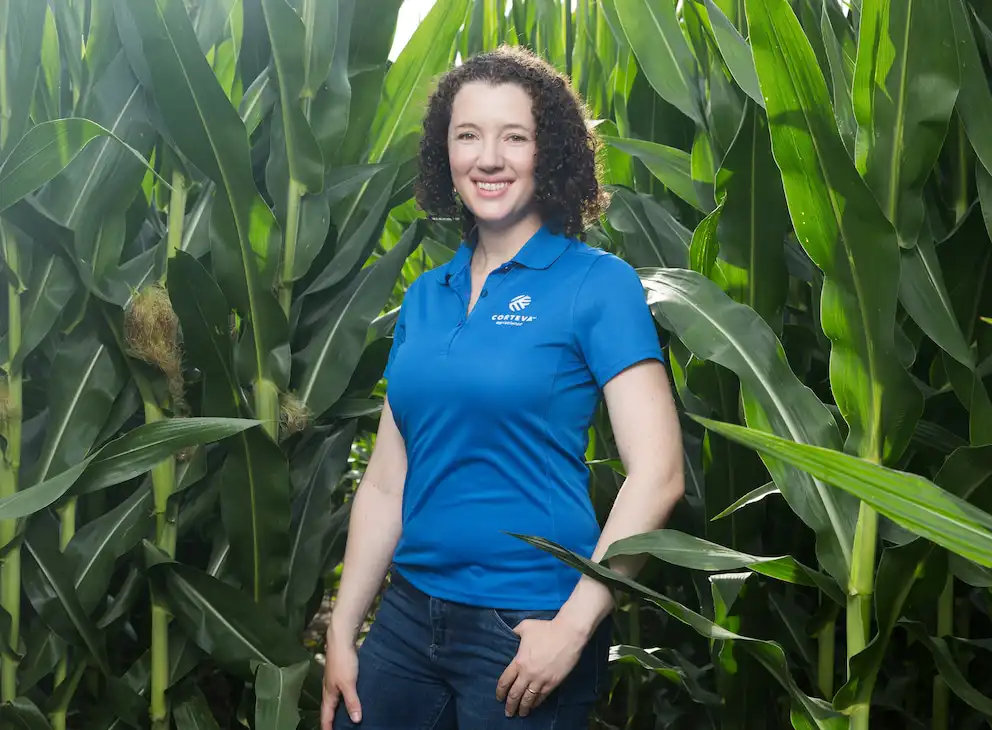
Early Career Scientist Award: Emily Ziemke
This award recognizes a scientist in early stages of their plant breeding career who exhibits the ability to establish strong research foundations, to interact with multi-disciplinary teams, and to participate in relevant professional societies.
The 2019 recipient of the NAPB Early Career Scientist Award is Dr. Emily (Combs) Ziemke, North American Corn Technology Lead for Corteva AgriscienceTM in Mankato, MN. Ziemke and her team evaluate, deploy and optimize technologies such as genetic prediction in Corteva North America corn breeding programs. Her research interests include integrating exotic germplasm into elite corn breeding programs, new experimental designs and new methods of genomic selection.
As one of her colleagues comments: “Emily has shown leadership in the integration of cutting edge technology to increase diversity in maize populations.” Ziemke is also active in the broader plant breeding community, supporting Module 2 (optimizing breeding schemes) of the Gates-funded CGIAR Excellence in Breeding program. She is active in The GreenSeam, a southern Minnesota agriculture advocacy organization, and volunteers with FarmAmerica in southern Minnesota as part of an outreach program for area middle-school students. In 2018, she received the Emerging Leaders in Plant Sciences Award from the University of Minnesota.
Another colleague comments: “Emily has been dedicated to serving the community throughout her career. She has participated in a number of activities to reach the next generation and expose them to agriculture and STEM more broadly. These activities can be an individual’s single most important contribution to solving the major challenges we face in the future, and Emily fully embraces these opportunities.”
In her current position at Corteva, according to a colleague, “Emily quickly established herself as a leader at our company and has made many scientific and operational contributions. She does not back down from any challenge and emotes positivity throughout her interactions with others.”
Within the NAPB, Ziemke has spearheaded the development of student-oriented activities, increasing student participation and career development. She is past chair of the Communications Committee and incoming chair of the Advocacy Committee, which develops strategies to engage legislators and the public about the importance of plant breeding.
Ziemke received her Ph.D. in applied plant sciences with a concentration in plant breeding and genetics from the University of Minnesota ­– Twin Cities, where she was advised by Dr. Rex Bernardo. In graduate school, her research focused on genomic selection to introgress dwarfing into elite corn populations.
She earned her bachelor’s degree in biology with a concentration in genetics and development from Cornell University. While at Cornell, Ziemke worked for Dr. Mark Sorrells on pre-harvest sprouting in wheat. During her time as a graduate and undergraduate student, she completed internships with The Samuel Roberts Noble Foundation, Cold Spring Harbor Laboratory, DuPont Pioneer, and CIMMYT.
In summary of Ziemke’s qualifications for the 2019 Early Career Scientist Award, one colleague states: “Dr. Ziemke is an energetic, aggressive, and accomplished young plant breeder who is poised to be a major player in the sciences of plant breeding and the seed industry. Her passion and commitment are obvious and contagious. She leads through action and example.” Ziemke lives in Mankato, Minnesota with her husband Mitch. When she’s not in the field, she enjoys cooking, gardening, and traveling new places.



